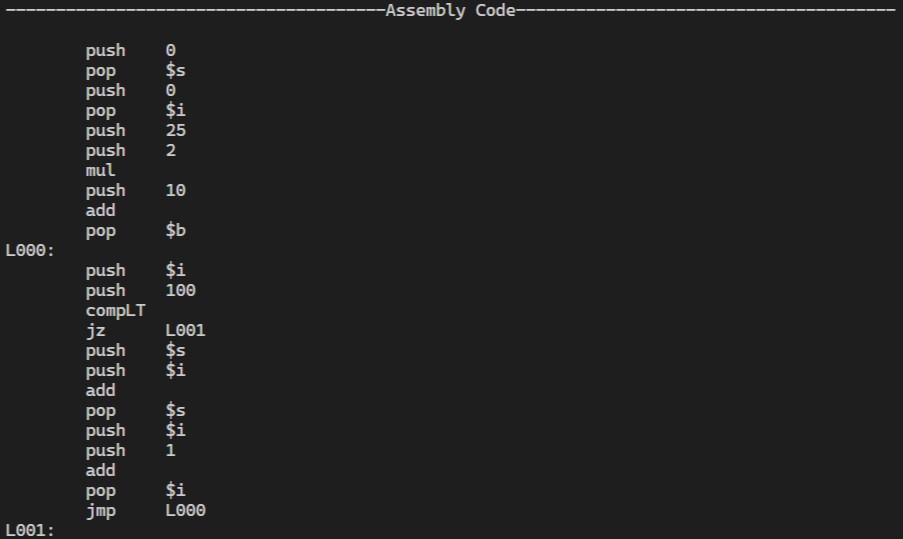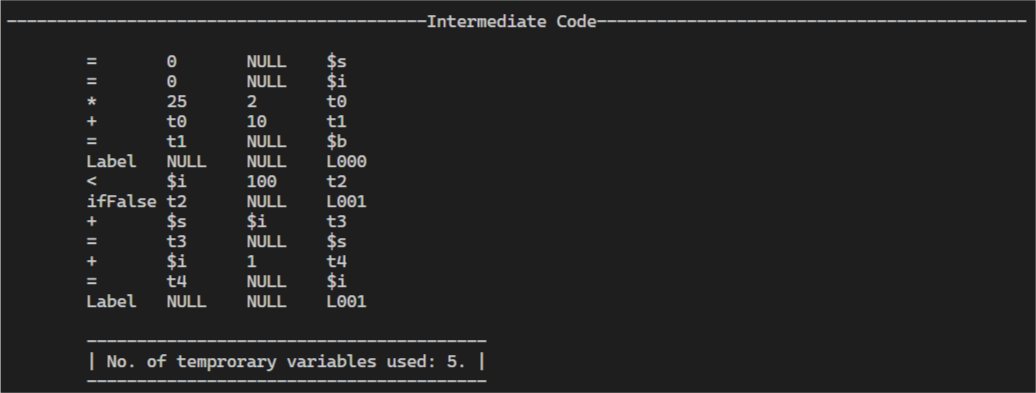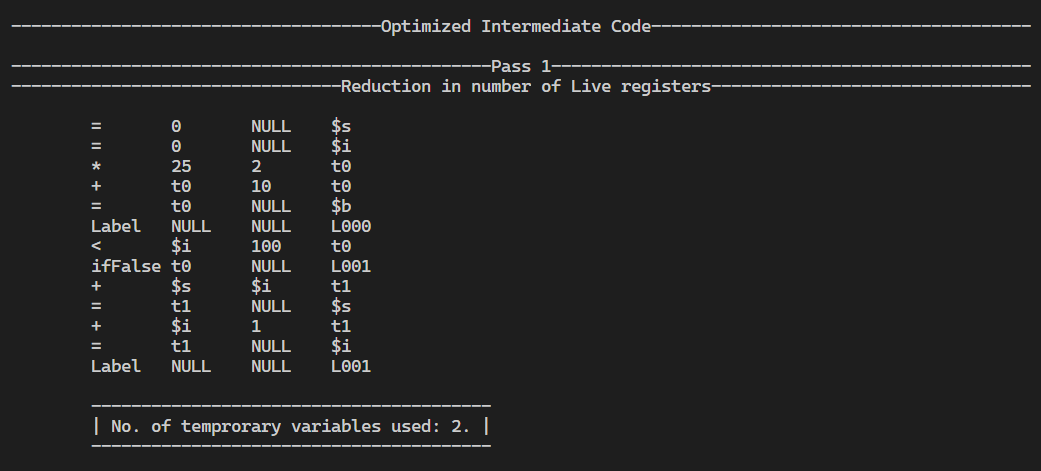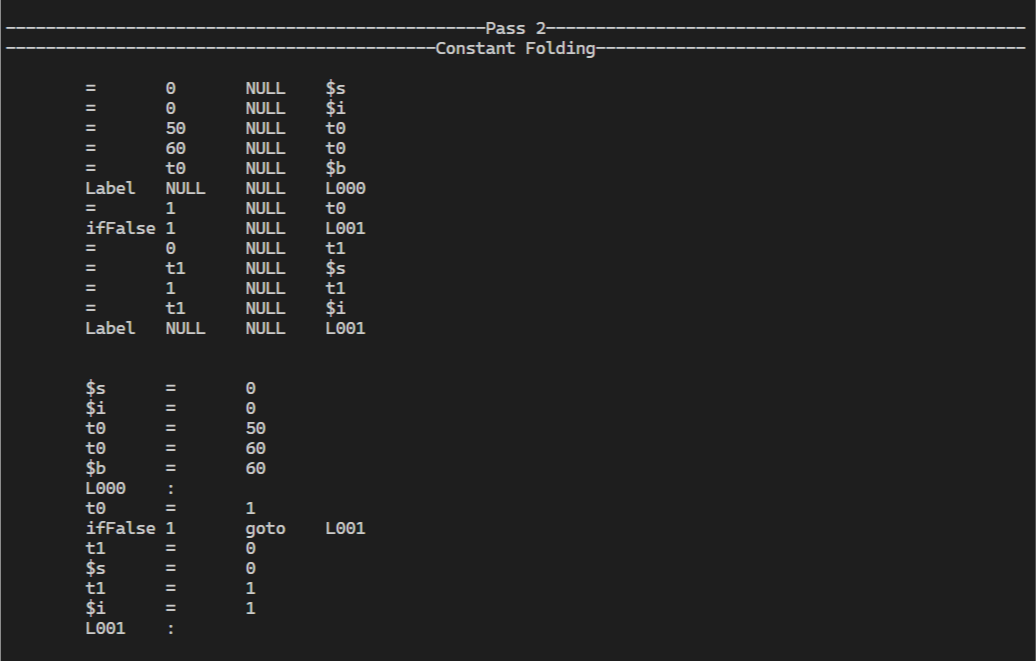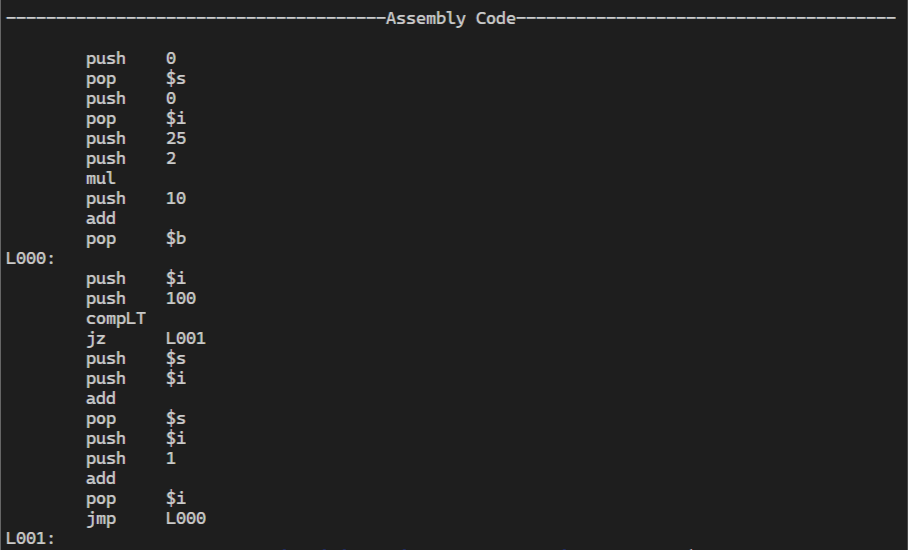| Chapter No. | Title |
|---|---|
| 1. | INTRODUCTION |
| 2. | ARCHITECTURE OF LANGUAGE |
| 3. | LITERATURE SURVEY |
| 4. | CONTEXT FREE GRAMMAR |
| 5. | DESIGN STRATEGY |
| 6. | IMPLEMENTATION DETAILS |
| 7. | INSTRUCTIONS FOR USING THE COMPILER |
| 8. | RESULTS AND SHORTCOMINGS |
| 9. | SNAPSHOTS |
| 10. | CONCLUSION |
| 11. | FURTHER ENHANCEMENTS |
| 12. | REFERENCES/BIBLIOGRAPHY |
Our mini-compiler is built for a subset of the PhP language (i.e. only while and if-else statements). We have used tools such as yacc, lex and Python scripts to build the complete compiler. An example of what our compiler produces -
Our compiler supports the following language features -
- We handle variables of integer type only and it supports all integer operations.
- All types of arithmetic and logical expressions are handled.
- While and if-else statements are also handled.
- There are usually multiple scopes in a program.
- Scope is decided on how many open curly braces we see before we store the variable in the symbol table.
- Whenever we see a variable declared or initialized with a constant value, we store it in the symbol table.
- The abstract syntax tree is generated as we parse the program.
- A tree node is created based on the type of tokens parsed.
- We handle three basic types of nodes, that is - constant, identifier and operator.
- All these nodes are built from bottom up to form the abstract syntax tree.
- To generate intermediate code, we also make use of the parse tree indirectly.
- We have written quadruple form of code to a file based on the syntax we are currently parsing in the program.
- We make use of multiple stacks for this process.
- We have performed reduction in number of live registers and constant folding optimization.
- We have performed the optimization using C and Python.
- We analyze the program line by line and use string manipulation and stack to perform these optimizations.
- The scanner doesn’t crash when it comes across unknown symbols.
- The parser doesn’t stop parsing on encountering error and prints a syntax error at the corresponding line number.
- Semantic analyzer produces an error on uninitialized variables, undeclared variables and re-declaration of variables.
- The code generator expects error free code to be passed to it.
- Target code is generated using a simple load-use-store mechanism.
- This is done by looking at quadruple address code line by line.
- We use lex, yacc and custom code to generate the symbol table.
- We hold the type, value and name of variables in an array of structures.
- These array of structures are different for different scopes.
- The symbol table therefore has an array of scopes which store an array of variables.
- We also use a stack to maintain the current scope.
- The abstract syntax tree basically consists of only three types of nodes that we have defined -
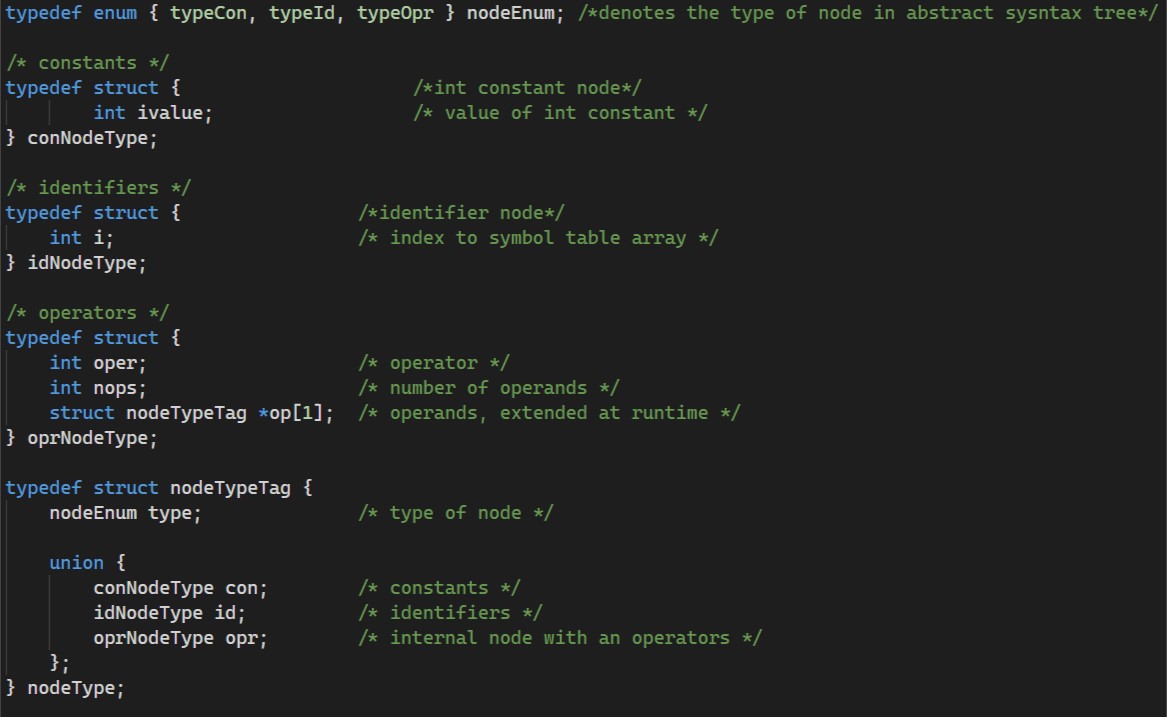
- These nodes are built bottom up using yacc.
- We maintain a stack of all the operators and identifiers we parse. There’s also a stack for maintaining the labels.
- When a production symbol is completely parsed, we pop from the stack and print it to a file according to the symbol we parsed.
- We make use of the labels stack when dealing with the while loop and switch construct. Appropriately consuming the stack to print labels for loop and case statements.
- Also an arithmetic code generation function, which generates suitable code for any required operator.
- We use Python and basic string manipulation to convert three address code into optimized three address code.
- For constant folding we just inspect every statement and use raw string manipulation.
- For dead code removal, we use Python sets to find out variables not being used in the code.
- We use Python and basic string manipulation to convert optimized three address code into target assembly code.
- We use a hash table just to maintain the required condition variable to be loaded for the while loop.
- In the parser, we use yacc’s built-in error handling mechanism.
- In the semantic analyzer we use the symbol table to catch any errors.
sudo apt update
sudo apt install flex
sudo apt install bison- Change your directory to PhP-Compiler.
- Write your code in sample.php file.
- Then run
bash compiler.shin the terminal of your linux machine.
- Our compiler is a very minimal and basic, and handles programs which purely perform mathematical computations.
- Error handling of our compiler is not exhaustive and too simple to handle complicated errors.
- Assembly code output will be correct for any type of program that our grammar parses. However, the cost of the program is high due to a simple assembly generation algorithm.
- It’s very easy to type a command to compile a program, but writing and understanding all phases of a compiler is challenging.
- Powerful tools like Lex and Yacc can be used in order to replicate or build a compiler.
- Working on this project has helped us grasp the internals and all the phases of a compiler.
- Handling more data types.
- Handling arrays, pointers etc.
- Function calls and argument parsing.
- More efficient assembly code generator.
- Intermediate Code Generation - https://www.cse.iitm.ac.in/~rupesh/teaching/compiler/aug15/schedule/5-ir.pdf
- Lex and Yacc: A Brisk Tutorial - https://www2.cs.arizona.edu/classes/cs453/fall14/DOCS/tutorial-large.pdf
- Assembly Code Generation - https://web.cs.ucdavis.edu/~pandey/Teaching/ECS142/Lects/final.codegen.pdf
- Course notes.

